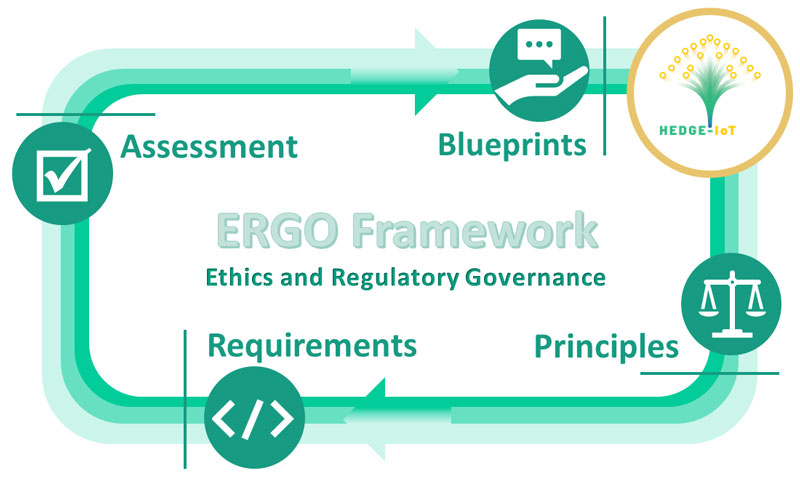by Luigi Briguglio, Tetiana Vasylieva, and Carmela Occhipinti (CyberEthics Lab.)
The establishment of an ethics and regulatory governance framework during the whole development lifecycle ensures the embedding of values and rules, setting the stage for a transformative journey towards sustainable energy practices.
Daily news reports on global disasters and impacts caused by climate change, such as rivers that increasingly take on a torrential character and that suddenly flood inhabited lands or that dry up, extreme precipitations that in a single day cause entire season’s worth of water to fall, melting of the ice of glaciers at high altitudes and at Arctic pole. These disasters are causing enormous losses of human life and putting at risk the availability of resources for future generations, raising questions of resilience and sustainability. Faced with these situations and the unanimous request of scientists and civil society, more than 100 nations have shared at COP 28 (the 28th annual United Nations climate meeting, held in December 2023 in Dubai) [1] their commitment with the fifth iteration of the Global Stocktake (GST), adopting eight steps to limit global temperature rise to 1.5 degrees C. The “Global Renewables and Energy Efficiency Pledge” is the first step and is characterised by ambitious targets, including (i) tripling global installed renewable energy capacity; (ii) doubling the annual rate of energy efficiency improvements; and (iii) elevating the principle of energy efficiency as the linchpin in policy, planning, and major investments.
Aligned with this commitment is the European initiative of the “Digitalising the Energy Sector – EU Action Plan” [2] that can significantly boost EU’s energy efficiency, resilience and sustainability through the digital transformation. Indeed, this plan (launched in 2022) focuses on integrating digital technologies such as Artificial Intelligence (AI), Internet of Things (IoT), data space and blockchain to optimise energy production, distribution and consumption. Key objectives include improving grid resilience, enabling smart metering, and fostering innovation in renewable energy sources. Therefore, this plan can boost renewable energy use and unlock the full potential of the energy smart grid, taking care of relevant challenges, such as:
- Grid Stability and Resilience: AI and IoT can optimise energy distribution and consumption, predicting and responding to fluctuations in demand. Blockchain can enhance grid security by ensuring transparent and tamper-proof energy transactions.
- Energy Efficiency: IoT-enabled smart meters and AI-driven analytics can help reduce energy wastage by providing real-time data and insights, allowing consumers and companies to manage energy usage more effectively.
- Integration of Renewable Energy Sources: AI and IoT can improve the integration and management of renewable energy sources by predicting production patterns and balancing supply and demand. Blockchain can facilitate decentralised energy trading, supporting the growth of renewable energy markets.
- Cybersecurity: With the increasing digitalisation of the energy sector, ensuring robust cybersecurity measures is crucial. AI can detect and mitigate cyber threats in real-time, while blockchain and data space can provide secure data storage, data exchange and transaction validation, reducing vulnerabilities in the energy infrastructure.
In this context, the HEDGE-IOT [L1] project proposes an innovative digital framework to deploy IoT across the whole energy ecosystem (i.e. from “behind-the-meter” to the transmission level) and leverage AI/ML tools to enhance intelligence in both edge (i.e. in proximity of the IoT) and cloud layers. The HEDGE-IOT project aims to address challenges by considering, since the beginning and throughout all the lifecycle of the development process, the ethics and regulatory perspectives. Although this is the reasonable approach, at least to ensure compliance with the existing regulation, it is still surprisingly the most unusual and considered “out-of-box”.
Therefore, the HEDGE-IOT project is establishing an ethics and regulatory governance (ERGO) framework considering provisionally relevant regulations, such as:
- Data Act (EU 2023/2854), ensuring fair use of, share and access to data (i.e. who can use what data and under which conditions) generated by IoT devices. The Data Act was published in December 2023, entered in force in January 2024, and it will become applicable from September 2025.
- General Data Protection Regulation (EU 2016/679), which lays the foundation to ensure privacy and data protection rights of individuals when dealing with their personal data treatment.
- AI Act (approved by the Council of the European Union on May 21st 2024), EU Ethics Guidelines for Trustworthy AI (2019) and the UN Interim Report “Governing AI for Humanity” [3] to ensure the trustworthiness, robustness and safety of AI systems and their adherence to EU values within the European market.

Figure 1: Overview of the Hedge IoT Ethics and Regulatory Governance (ERGO) framework.
The HEDGE-IOT ERGO framework drives the research and innovation process by (i) setting key principles to be considered by the development team during the whole lifecycle, and based on these principles; and (ii) providing ethics and regulatory requirements to be embedded into the development of the system. To monitor and assess the compliance with the identified requirements, the ERGO framework is also defining assessment checklists, allowing the development team to be aware of potential ethics and regulatory concerns. The monitoring and assessment process, which is iterative and incremental, enabled by the ERGO framework will allow the project team to gather and collect experiences, concerns, countermeasures and lessons learned to be analysed and therefore to derive blueprints in terms of recommendations and policy options for improving future operational best practices and regulations.
This document is part of a project that has received funding from the European Union’s Horizon Europe research and innovation programme under the Grant Agreement number 101136216.
Links:
[L1] https://hedgeiot.eu/
[L2] https://cyberethicslab.com
References:
[1] United Nations, Climate Change Conference – United Arab Emirates, 2023. https://unfccc.int/cop28/
[2] European Commission, Digitalising the energy sector – EU action plan, 2022. https://ec.europa.eu/info/law/better-regulation/have-your-say/initiatives/13141-Digitalising-the-energy-sector-EU-action-plan_en
[3] United Nations, AI Advisory Board, Interim Report: Governing AI for Humanity, 2023. https://www.un.org/en/ai-advisory-body
Please contact:
Luigi Briguglio, CyberEthics Lab., Italy
Tetiana Vasylieva, CyberEthics Lab., Italy
Carmela Occhipinti, CyberEthics Lab., Italy











